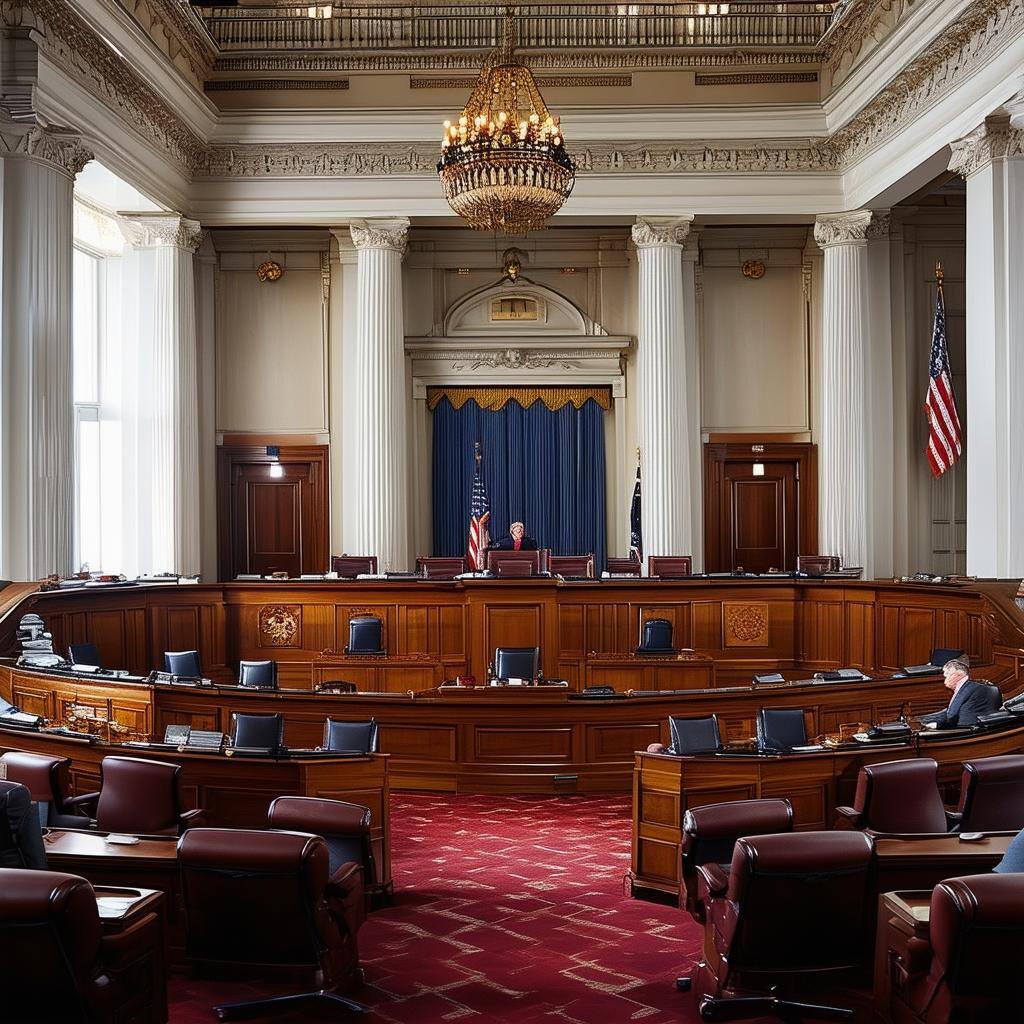On April 29, on a party-line vote, the Senate Finance Committee approved the nomination of Ken Kies to be Treasury Assistant Secretary for Tax Policy. Kies will play a key role in the development of all tax legislation, but especially now in the crafting of the tax portion of the massive reconciliation bill.
1 min read
Senate Finance Sends Kies Nomination to Senate Floor for Confirmation Vote
By NAIFA on 5/15/25 10:16 AM
Topics: Taxes Congress
1 min read
Deficit Projections Could Complicate Tax Cuts Legislation
By NAIFA on 4/15/25 9:07 AM
On March 12, the Treasury Department announced that the federal deficit has grown to $1.15 trillion over the first five months (October through February) of Fiscal Year (FY) 2025. This is 17 percent higher than the deficit level at this time last year. According to the Treasury release, the deficit in February alone grew to $307 billion.
Topics: Taxes Debt
2 min read
House Tax-Writer Introduces Long-Term Care Bill
By NAIFA on 4/15/25 8:58 AM
On March 12, Rep. Tom Suozzi (D-NY), a member of the tax-writing House Ways & Means Committee, introduced a bipartisan bill, the WISH Act, that would create a public-private partnership to address the affordability of long-term care. The bill was cosponsored by Rep. John Moolenaar (R-MI).
Topics: Long-Term Care Taxes
1 min read
Senate Majority Leader Touts Estate Tax Repeal
By NAIFA on 4/15/25 8:29 AM
Sen. John Thune (R-SD), the Senate’s Majority Leader and a member of the tax-writing Senate Finance Committee, is pushing for inclusion of complete estate tax repeal in the upcoming tax reconciliation bill. Sen. Thune listed estate tax repeal as among his priorities—another is making permanent the extension of expiring tax rules.
Topics: Estate Planning Taxes
2 min read
Senators, House Members Introduce Legislation to Make Permanent Section 199A
By NAIFA on 2/17/25 9:28 AM
Legislation to make permanent the section 199A deduction for qualifying noncorporate business income has been introduced in both the House and Senate. The legislation is partisan—only Republicans cosponsored it in both chambers of Congress—but the number of cosponsors (35 in the Senate, including most of the Senate GOP’s leadership, and 152 in the House) demonstrates the strength of support for the measure.
Topics: Taxes Congress
1 min read
Key Tax Writer Introduces Bill to Extend Expiring Tax Rules Permanently
By NAIFA on 2/17/25 9:25 AM
On January 3, Rep. Vern Buchanan (R-FL), a senior member of the tax-writing Ways & Means Committee, introduced H.R.143, a bill that would make permanent expiring individual tax rates (including section 199A), the standard deduction, the estate tax personal exemption, and other individual tax provisions. The bill also specifically repeals the expiration date of section 199A, the deduction for qualifying noncorporate business income.
Topics: Taxes Congress
1 min read
Tax Regs Again Subject to White House Review
By NAIFA on 2/17/25 9:19 AM
In a January 31 executive order (EO), President Trump once again made Treasury tax regulations subject to White House review. Office of Information and Regulatory Affairs (OIRA) review of tax regulations was not required until President Trump’s first term, from 2017 to 2021. But then-President Biden reversed that order, again exempting tax regulations from OIRA review. Now, per this latest Trump EO, IRA will again be reviewing proposed tax regulations.
Topics: Taxes
1 min read
House Republican Introduces Bill to Expand Section 199A, Repeal Estate Tax
By NAIFA on 2/17/25 9:16 AM
On January 3, Rep. Andy Biggs (R-AZ) introduced legislation that would repeal the limits on the kinds of businesses that are eligible for the section 199A deduction for qualifying noncorporate business income. The bill would also repeal the estate tax while retaining the step up in basis for assets passing to heirs after the decedent’s death.
Topics: Small Business Taxes Congress
1 min read
Bipartisan Senate Bill Would Increase Above-the-Line Charitable Deduction
By NAIFA on 2/17/25 9:09 AM
A bipartisan Senate bill, the “Charitable Act,” would reestablish an above-the-line charitable deduction. The deduction would allow taxpayers who do not itemize to deduct their charitable contributions up to an amount equal to up to one third of the standard deduction.
Topics: Taxes Congress
1 min read
Congress Announces New Members of Tax-Writing Committees
By NAIFA on 1/14/25 1:15 PM
Both Republicans and Democrats have named the members joining the House Ways & Means and Senate Finance Committees for the 119th Congress. These lawmakers will have particular influence over what goes in and what stays out of the massive tax bill Congress intends to enact this year.
Topics: Taxes Congress
2 min read
Donald Trump Wins Presidency
By NAIFA on 11/22/24 10:53 AM
Donald Trump’s victory was declared when, at just about 5:30 a.m. on Wednesday, November 6, the media projected he had won swing state Wisconsin, taking him over the 270-vote electoral college count needed to win the presidency.
Topics: Legislation & Regulations Taxes Debt Congress Presidency Federal Deficit
3 min read
GOP Will Control the Senate in the 119th Congress
By NAIFA on 11/22/24 10:52 AM
Republicans will control the Senate in the incoming 119th Congress (2025-2026). The GOP’s undisputed win of 53 of the Senate’s 100 seats means Democrats have lost control of the upper chamber in the 119th Congress.
Topics: Legislation & Regulations Long-Term Care Insurance Taxes Debt Congress
1 min read
Republicans to Control the House in 2025-2026
By NAIFA on 11/22/24 10:52 AM
Republicans won the 218 seats needed to control the House; it will give the GOP the “trifecta”—a clean sweep of all three levers of legislative power in Washington.
Topics: Taxes Congress
2 min read
Prospects for 2025 Tax Legislation
By NAIFA on 11/22/24 10:51 AM
If, as expected, the GOP controls both the House and Senate next year, the risks and challenges of the 2025 tax bill have become a bit clearer. Here is a run-down.
Topics: Affordable Care Act Taxes Congress Social Security
1 min read
Senate Democrats Introduce Bill to Subject Pass-Through Income to Payroll Tax
By NAIFA on 11/22/24 10:49 AM
Four Democratic Senators have introduced legislation that would subject pass-through (non-corporate) business income to payroll (Social Security/Medicare) taxes. Currently, many pass-through businesses (S corporations, partnerships, sole proprietorships) characterize some of their business income as dividends or other non-wage income and thus avoid having to include it in the payroll tax base.
Topics: Legislation & Regulations Taxes Congress
4 min read
Congress Punts Almost Everything to Lame Duck
By NAIFA on 10/15/24 10:57 AM
On September 26 President Biden signed into law the three-month funding bill that avoided a government shutdown on October 1. The continuing resolution (CR) extended fiscal year (FY) 2024 funding levels until December 20 and made few (none of them controversial) policy changes. So, the tough issues—e.g., FY 2025 funding levels, whether to block certain regulations (including the fiduciary rule)—were left to be resolved during the November-December lame duck session of the 118th Congress.
Topics: Legislation & Regulations Taxes Debt Congress SECURE 2.0
2 min read
Senate Finance Holds Hearing on 2025 Tax Issues
By NAIFA on 10/15/24 10:56 AM
On September 12, the Senate Finance Committee held a hearing to lay the groundwork for the 2025 tax bill effort to cut down on “tax avoidance.” The hearing highlighted proposals to improve tax equity in current law. It also focused considerable discussion on section 199A, the deduction for qualifying noncorporate business income.
Topics: Legislation & Regulations Taxes Congress
1 min read
ACA Premium Subsidies at Risk
By NAIFA on 10/15/24 10:55 AM
The premium tax subsidies that allow lower-income individuals to get Affordable Care Act (ACA) health insurance free or at reduced cost are scheduled to expire at the end of 2025. If the current subsidies do expire, millions of low-income individuals will face significant health insurance cost increases. Extension of the subsidies will be a key issue in the 2025 tax bill and/or during the November-December lame-duck session of the 118th Congress.
Topics: Legislation & Regulations Affordable Care Act Taxes Congress
1 min read
Senate Unanimously Passes ABLE Account Permanency Bill
By NAIFA on 10/15/24 10:54 AM
The ENABLE Act, a bill that makes permanent three provisions of the ABLE account law, passed the Senate under a unanimous consent agreement on September 19. The bill, the ENABLE Act, was introduced in the Senate by Sen. Bob Casey (D-PA), the author of the original ABLE Act, and Sen. Eric Schmitt (R-MO) and in the House by Rep. Lloyd Smucker (R-PA) and Rep. Don Beyer (D-VA).
Topics: Legislation & Regulations Taxes Congress
2 min read
Economists Forecast Huge New Debt from Presidential Candidates’ Tax Proposals
By NAIFA on 10/15/24 10:53 AM
Private sector economists, including the respected Committee for a Responsible Federal Budget (CRFB), are sounding the alarm over the cost of both presidential candidates’ tax proposals. This suggests the 2025 tax bill will be as much about revenue as tax policy.




















.png?width=600&height=90&name=Support%20IFAPAC%20%20(600%20%C3%97%2090%20px).png)
